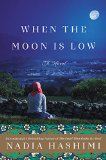Summary | Excerpt | Reading Guide | Reviews | Beyond the Book | Readalikes | Genres & Themes | Author Bio

A Novel
by Nadia Hashimi
Asad seemed to be born feeling he owned the world. He was, after all, my father's first son, a source of immense pride for the family. He would carry our family name, inherit the land, and care for our parents in their golden years. As if he knew what was to be expected of him later in life, he consumed my mother and father. He nursed until my mother was raw and exhausted. My father scrambled to construct toys for his son to play with, planned for his education, and became even more intent that he bring home enough to keep his wife, a new mother, in good health and well nourished.
My mother was proud to have given her husband a son, and a healthy one at that. Fearful that the neighbors or family members would be jealous and cast an evil eye on him, she sewed a small blue stone, an amulet, to the baby clothing her sister-in- law had given her to ward off the evil eye, or nazar. That wasn't all she did. She had an arsenal of tricks to combat the many faces of nazar. If Asad felt heavier in her hands or if a visitor commented on his pink, fleshy cheeks, she would look to her nails. She punctuated their compliments with whispers of nam-e- khoda, praising God's name. Arrogance attracted nazar with the ferocity of lightning on an open field.
Day by day, Asad fattened off our mother's milk, his face taking 10 Nadia Hashimi shape and his thighs thickening. Forty days after his birth, my mother breathed a sigh of relief that her son had survived the most dangerous time. My mother had seen a neighbor's baby, two weeks after its birth, stiffen and shake desperately as if overcome by a wave of evil. The newborn's spirit was taken before it could be named. I learned later that cutting an umbilical cord with a dirty knife probably seeded toxic bacteria in the baby's blood. True or not, we Afghans are firm believers in not counting our chickens until forty days after they've hatched.
Like so many mothers, Madar-jan called upon the powers of wild rue seeds, called espand. She let a handful of the black seeds smolder and pop over an open flame, the smoke wafting above Asad's head as she sang
It banishes the Evil eye, it is espand
The blessing of King Naqshband
Eye of nil, Eye of folks
Eye of allies, Eye of foes
Who ever wishes ill, let burn in these coals.
The song traced back to the pre-Islamic religion of Zoroastrianism, though even Muslims trusted its powers. My father watched, pleased that his wife was taking such care to safeguard his progeny. And, oh, how it must have worked! My mother's death didn't affect my brother's life the way it did mine. He was still my father's firstborn, still managed to be successful in life, usually at the expense of others. His careless doings hurt those around him, often me, and yet he always seemed to emerge unscathed. In the two short years my mother nurtured him, he had gained enough strength to secure his place in the world.
But my mother died before she could pin an amulet to my gown, before she could whisper nam-e- khoda, before she could look at her fingernails, and before she could lovingly waft the espand over my head. My life became a series of misfortunes, a product of unthwarted evil eyes. My birth was haunted by the death of my mother and, while Boba-jan mournfully whispered the azaan in my ear, a very different prayer was being said over my mother's depleted body. The azaan, spoken in my grandfather's voice, wove its way through to the fabric of my being, telling me to keep faith. My salvation was that I listened.
My mother was buried in a newly dedicated cemetery near our home. I didn't visit much, partly because no one would take me and partly because of my lingering guilt. I knew I had put her there and people would remind me of that.
Excerpted from When the Moon Is Low by Nadia Hashimi. Copyright © 2015 by Nadia Hashimi. Excerpted by permission of William Morrow. All rights reserved. No part of this excerpt may be reproduced or reprinted without permission in writing from the publisher.




On the whole, human beings want to be good, but not too good and not quite all the time
Click Here to find out who said this, as well as discovering other famous literary quotes!
Your guide toexceptional books
BookBrowse seeks out and recommends the best in contemporary fiction and nonfiction—books that not only engage and entertain but also deepen our understanding of ourselves and the world around us.